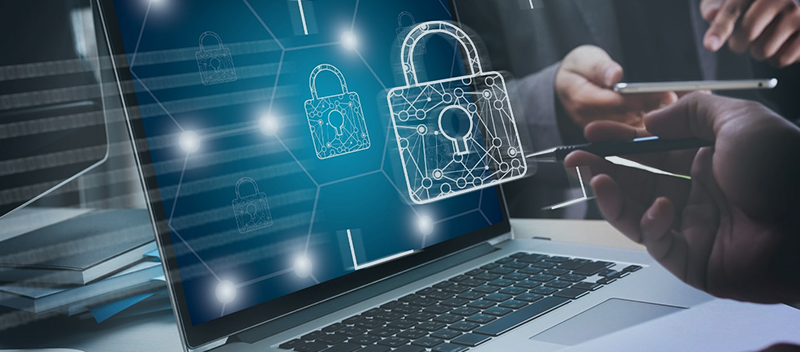Blog Cybersecurity Compliance: A Profit Multiplier for Accounting Businesses
Cybersecurity Compliance: A Profit Multiplier for Accounting Businesses

As the accounting sector evolves with technological advancements, it becomes increasingly interconnected with the digital world. While this shift to cloud-based systems has simplified access and management of financial data, it also introduces substantial security risks. Even robust IT infrastructures are not immune to breaches by threat actors, making protecting internal accounting data a pressing concern.
In response to these threats, businesses increasingly use cybersecurity methods and services to identify and address system vulnerabilities. The rising demand has proven that cybersecurity is a crucial tool in today’s world.
This article will explore how cybersecurity intersects with the accounting sector and how it can become a profit multiplier.
Understanding Cybersecurity Compliance
Cybersecurity compliance ensures an organization’s adherence to the myriad of regulations, standards, and laws pertinent to data privacy and information security. A diverse range of organizations must comply with various cybersecurity standards and regulations, including:
- Healthcare entities must often comply with the Health Insurance Portability and Accountability Act (HIPAA), a regulation that safeguards patient health information.
- Financial institutions may need to adhere to the Payment Card Industry Data Security Standard (PCI-DSS) regulations protecting credit card data.
- Retailers and e-commerce businesses accepting online credit card payments might also be required to comply with PCI-DSS regulations.
- Companies managing the personal data of European citizens could be required to comply with the General Data Protection Regulation (GDPR).
- Specific industries, such as defense or energy, might be subject to industry-specific regulations and standards like NIST, ISO 27001, or CMMC.
For more on our cybersecurity and compliance services, Click Here
NIST Cybersecurity Framework
Much like financial risks, cybersecurity risks significantly impact an organization’s bottom line. This makes cybersecurity a key component of comprehensive risk management. The Cybersecurity Enhancement Act of 2014 expanded the role of the National Institute of Standards and Technology (NIST) to include the development of cybersecurity risk frameworks.
The components are based on pre-existing standards and best security practices from the government and various crucial industry sectors. It’s important to note that the NIST Framework is not a checklist but a guide for assessing risk and addressing security issues.
The NIST Cybersecurity Framework comprises three parts that help organizations formulate a thorough cybersecurity strategy:
The first component, the framework core, provides guidance information and cybersecurity activities, presenting industry standards to assist organizations in managing cyber risks.
The second component, the implementation tier, enables the organization to gauge its current cybersecurity posture, helping it determine the optimal level of standards for its cybersecurity program.
The final component, the framework profile, allows the organization to create a plan for mitigating cyber risks aligned with organizational objectives.
The NIST framework includes five main functions: identify, protect, detect, respond, and recover. These functions, which must be executed concurrently and continuously, support an organization in managing cybersecurity risk, dealing with threats, and learning from past activities.
Implementing NIST Standards in Accounting Businesses
The NIST framework integrates best practices for managing cybersecurity risks for your accounting business. It’s not a replacement but a supplement to existing processes.
Steps for implementing the NIST framework include:
- Define organizational objectives: This helps determine the scope and priority of security efforts.
- Assess your current position: Perform a risk assessment to understand your cybersecurity standing.
- Identify weaknesses: After gathering information, pinpoint areas of vulnerability.
- Implement plan: Execute the devised strategy based on the assessment.
Remember, cybersecurity is an ongoing process that requires continuous attention. As your accounting business evolves, reassess and update the strategy accordingly.
Cybersecurity Compliance in Accounting Businesses
Cybersecurity is a critical concern for accounting firms due to several key reasons:
- High susceptibility: Cyber threats are becoming more sophisticated, with a substantial increase in the frequency of incidents.
- Responsibility to protect client data: Firms handle sensitive client data, including social security numbers and financial information, which they must safeguard.
- Significant financial implications: The average cost of a data breach in the U.S. is $9.8 million as of 2023.
- Ease of hacking: Even individuals with minimal training can launch disruptive attacks, making the risk of cyberattacks even more prevalent.
- Reputational damage: Beyond monetary loss, cyberattacks can lead to significant reputational damage that can be challenging and costly.
Accounting firms handle vast amounts of sensitive data, making them prime targets for cybercriminals. Therefore, not only must these businesses implement robust technological defenses, but they also need to train their workforce to identify and mitigate potential threats.
Knowledge of cybersecurity and data governance is also crucial for upholding the integrity of financial data and safeguarding the firm’s reputation. Adhering to cybersecurity standards also ensures transparency and empowers consumers, as the law mandates.
Benefits of Cybersecurity Compliance for Accounting Businesses
Cybersecurity compliance holds immense benefits for accounting businesses:
- Safeguarding Client Confidentiality: Accounting firms handle sensitive client data, making cybersecurity crucial to maintain confidentiality.
- Preventing Financial Loss: Cyberattacks can lead to significant financial loss, which can be controlled through robust cybersecurity measures.
- Maintaining Regulatory Compliance: Adherence to cybersecurity regulations enhances the firm’s reputation and competitiveness.
- Protecting Reputation: Effective cybersecurity helps safeguard the firm’s reputation by preventing potential breaches.
- Business Continuity: In the event of a cyber incident, a robust cybersecurity framework ensures minimal disruption to operations.
Consequently, cybersecurity compliance can be a profit multiplier for accounting firms, enhancing client trust, preventing costly breaches, and unlocking new business opportunities with entities requiring stringent security standards.
To aid in this endeavor, TrustNet, with our team of industry experts, provides a comprehensive suite of cybersecurity compliance services tailored to your business needs. From implementing robust network security measures to conducting regular audits and penetration tests, TrustNet ensures all aspects of your cybersecurity compliance are fortified.
Empower your business with TrustNet’s complete cybersecurity and compliance solutions. Talk to an expert today.




